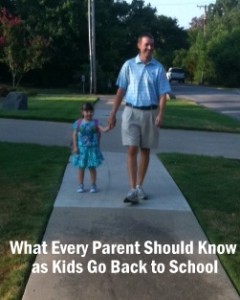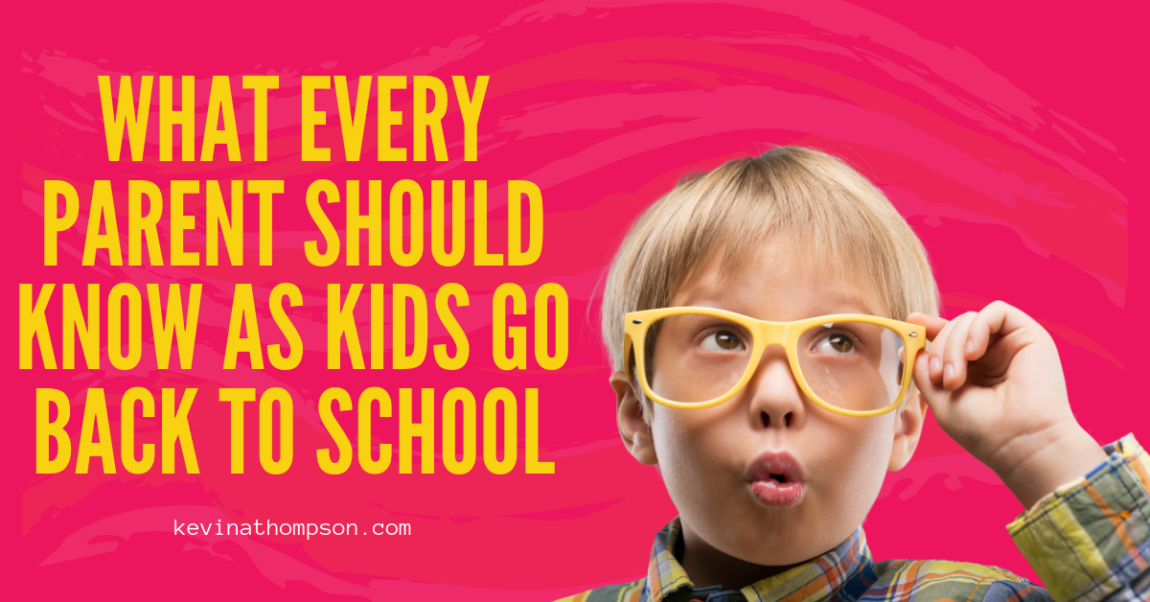“I would do anything to be a kid again.”
It’s a common statement by parents as kids head back to school. “Imagine not having a care in the world,” they think. (See: Parenting–Too Involved, Not Involved Enough)
When co mpared to our days of irate bosses, overwhelming work expectations, and the pressures of home, marriage, and family, the life of a 6-year-old looks appealing. A few coloring sheets, learning some sight words, lunch, recess, and a day which ends at 3:00 sounds like a perfect way to escape the pressures of modern adulthood.
mpared to our days of irate bosses, overwhelming work expectations, and the pressures of home, marriage, and family, the life of a 6-year-old looks appealing. A few coloring sheets, learning some sight words, lunch, recess, and a day which ends at 3:00 sounds like a perfect way to escape the pressures of modern adulthood.
Childhood seems stress-free, but it’s not. I was stressed every day I went to school as a kid. My children exhibit stress nearly every week that school is in session. The eyes of other children scream stress when I see them before school. While we think children aren’t stressed, they clearly are.
Watch them as they walk into school. See their:
- fear
- sadness
- doubt
- loneliness
- terror
- uncertainty
Forget about what we think going back to school is like and imagine it through the eyes of a child.
- You will walk into a building in which you are not in charge.
- People much larger than you will tell you what to do.
- You aren’t guaranteed any friends. (See: A Parenting Lesson from Jesus)
- Some of your peers might mock you, bully you, or just ignore you.
- You will be judged for every behavior.
- You will be expected to learn at a proper pace which others have determined.
- You will be expected to meet the expectations of the teacher, principal, and your parents.
- You will eat when you are told to eat.
- You will use the restroom when you are told to use the restroom.
- You will leave only when you are told you can leave.
- And you don’t necessarily know who will pick you up.
In the eyes of a child, going back to school sounds less like school and more like going back to prison.
Of course, we know it’s not.
We know a school is filled with great teachers who love children, a caring principal who would help in any way possible, and many great kids who will have a good time.
We know that no test score, no skill, no day or year, will define a person’s whole life.
We know life is filled with much more serious issues than what happens in elementary school.
We know a kid should just have fun, do their best, and enjoy the innocence of life.
But they don’t know that.
Not only is school often viewed through a different lens than adults, the previous list doesn’t even take into account what is happening at home.
- How many kids are hungry?
- How many of them haven’t got a good night’s sleep?
- How many have been abused?
- How many have watched their parents fight?
- How many don’t know where one or both of their parents are?
- How many have a sick parent, sibling, or grandparent?
There is a fact which many adults deny: many children are far more stressed than most adults.
Not only are kids expected to deal with all the things adults must deal with, but they have no skills with which to deal with that stress.
A person dies. A child doesn’t know why death happens, how often it happens, or if death could suddenly happen to everyone else or themselves.
A parent leaves. A child doesn’t know if they will come back. They don’t have the history to fully understand a business trip or a job which requires travel.
A teacher rebukes. A child often isn’t able to distinguish between a rebuke of behavior and a rebuke of heart.
The stress of childhood is far greater than we realize.
The least we can do for them is to recognize their stress, to give them empathy, to understand their struggles, and to know their lives are not as easy as we think.
This realization should change how we parent.
It should cause to:
- work hard the night before to prepare them for the next day. (See: The Best Way to Start the School Day)
- slow down of a morning, not adding to the hurry and worry of their day.
- make sure they have plenty of rest and are well-fed before school begins.
- take great care in the minutes and seconds as we drop them off, reassuring them of our love and their security.
- establish routines as we drop them off and pick them up to provide structure and predictably.
- have extreme empathy for them in recognizing the difficulty in their lives.
- focus as much on teaching them to manage stress as we instruct them to behave and do math.
It’s a hard concept to realize, but I believe it is true. Our kids live stress-filled lives. They may not experience more stress than adults, but they lack the knowledge and experience to properly handle that stress.
As a parent, I have three main responsibilities when it comes to helping my children deal with stress:
1. Talk about it. Every night we discuss each person’s day. What was your favorite thing? What was your least favorite thing? What is one thing you are worried about? I want them to become accustomed to describing their days, recognizing different emotions, and learning to communicate them to others. Talking about it teaches the child their emotions are important and they are not alone in dealing with them. It trains them to recognize concerns and strategize ways to handle them. (See: Conversation–The Key Skill of a Good Parent)
2. Don’t diminish it. It’s always easy to downplay the stress of another. In comparison to your problems, the concerns of your child are probably pretty minor. Yet if a bigger stress diminishes a smaller stress, then only one person on the planet should be stressed—whoever has the biggest problem. The truth is—whatever we are worried about is important. It’s important because we have made it important. Resist the temptation to diminish your child’s stress because it will not eliminate their stress; it will simply teach them not to talk about it with you.
3. Support them through it. There are times in which I can remove stress from my children, but a majority of the time I’m not called to keep them from it, but to help them through it. We do this through conversation, role-playing, and debriefing after the day is done. I tell them of the times I don’t handle stress properly. I let them know of the things I’m worried about (in general terms, not specifics). I reassure them that we all succeed and fail.
Our kids are stressed. We should neither ignore it or deny it. By recognizing it, we can assist them in learning how to cope with it.




12 Responses to What Every Parent Should Know as Kids Go Back to School